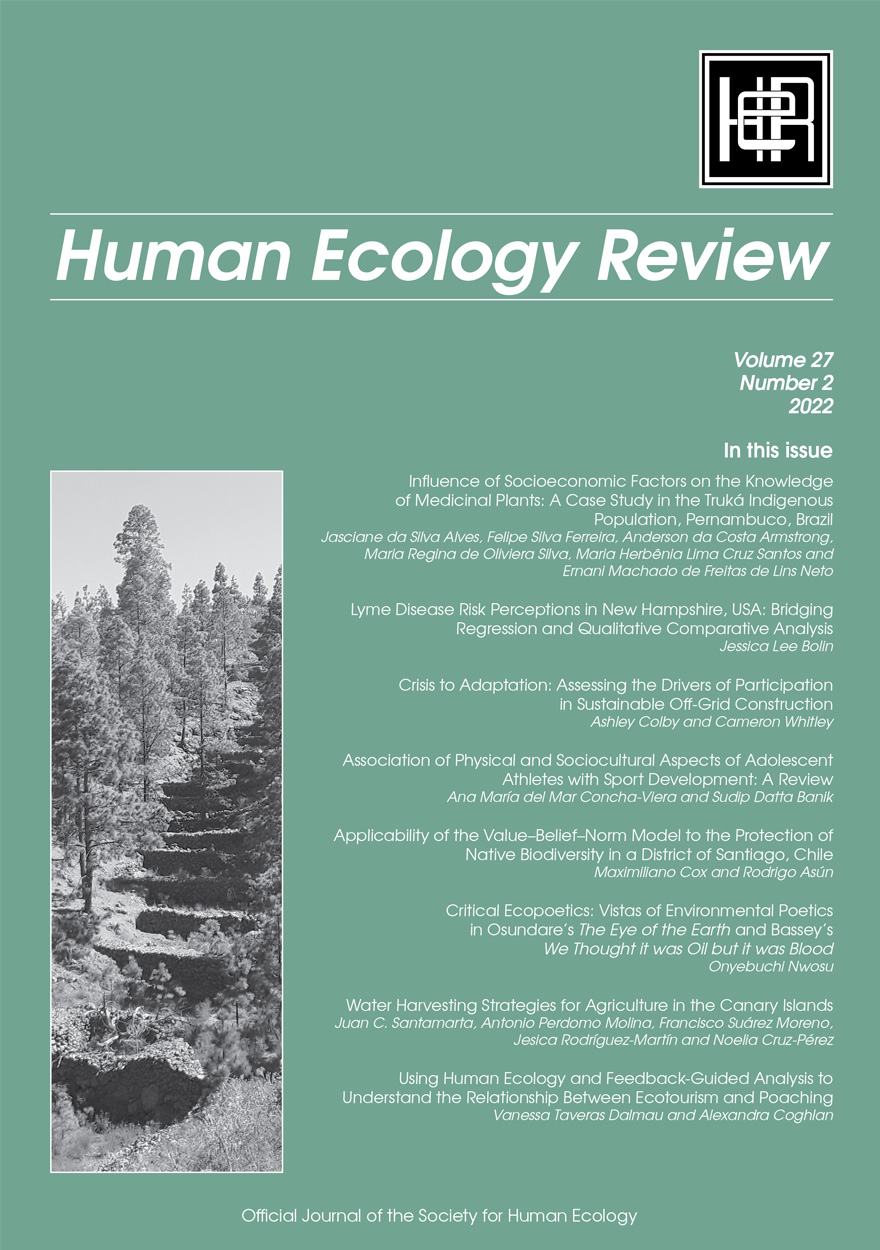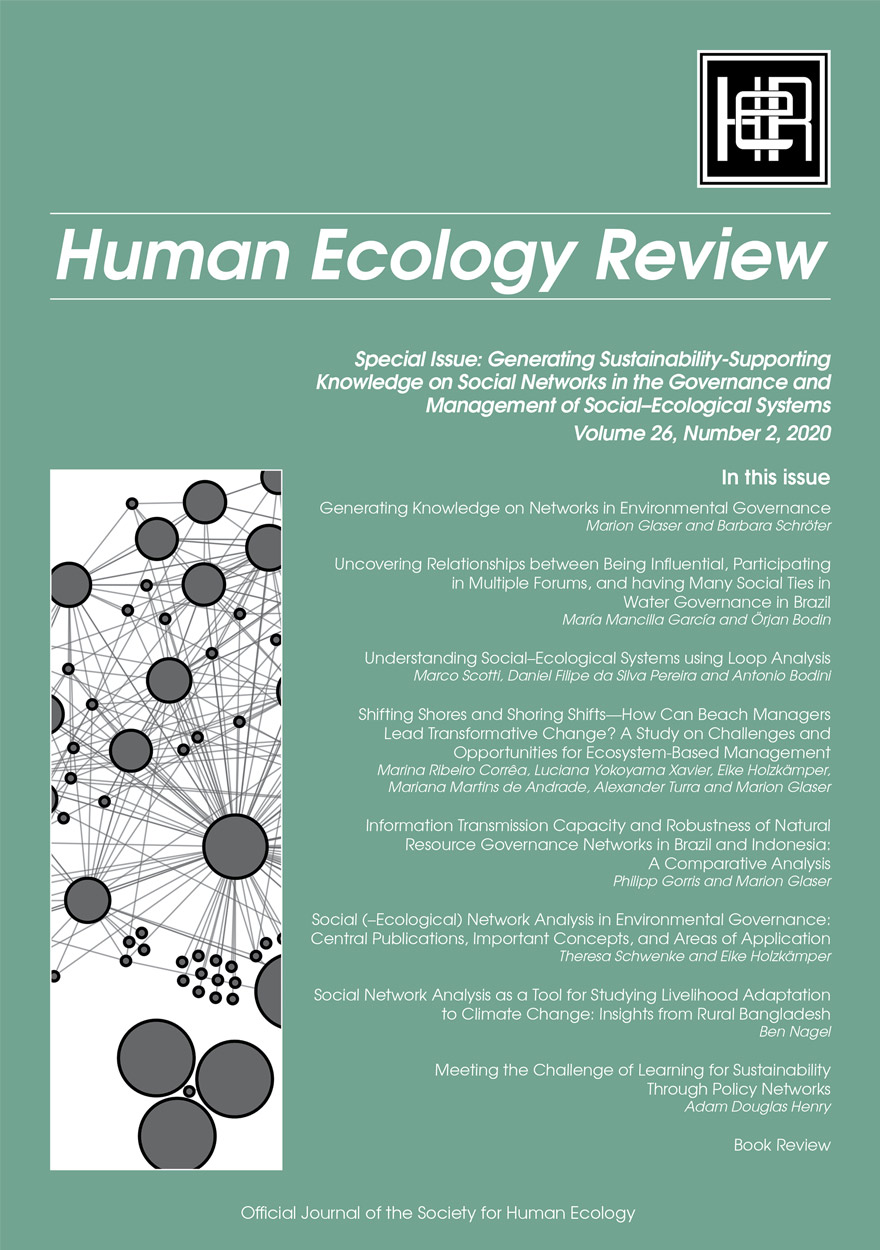Search titles
Displaying results 1 to 5 of 5.

Human Ecology Review: Volume 27, Number 2 »
Publication date: December 2022
Human Ecology Review 27(2) features contributions from researchers from around the world, including Brazil, the United States, Mexico, Chile, Australia, Uruguay, Spain, and Nigeria. Studies presented include the indigenous Truká people’s knowledge of medicinal plants in Pernambuco, Brazil (Alves et al.); perceptions of Lyme disease risk in New Hampshire, USA (Bolin); social and physical aspects of adolescent sport development (Concha-Viera and Datta Banik); the role of ecopolitics and ecopoetics in promoting environmental concerns about and resistance to oil exploration in Africa (Nwosu); traditional water harvesting and conservation in arid regions of the Canary Islands (Santamarta et al.); feedback-guided analysis of ecotourism and poaching in the Dominican Republic (Taveras Dalmau and Coghlan); motivations for participation in off-grid ecovillages, featuring a case study from Uruguay (Colby and Whitley); and biodiversity protection in Santiago, Chile (Cox and Asún).
Download for free
Not available for purchase

Human Ecology Review: Volume 26, Number 2 »
Publication date: July 2021
This volume is a special issue on ‘Generating Sustainability-Supporting Knowledge on Social Networks in the Governance and Management of Social–Ecological Systems’, compiled by guest editors Marion Glaser and Barbara Schröter. The collection of papers demonstrates the capacity of social network analysis to contribute to understanding the interactions of actors and institutions. María García and Örjan Bodin set out to differentiate to what extent power resides within network structures and whether it is rooted in actor attributes such as class and wealth. Marco Scotti, Daniel Pereira, and Antonio Bodini present loop analysis as a qualitative tool for linking disciplinary domains in integrated analyses of the natural and social science variables. Marina Corrêa and her co-authors examine the role and potential of public sector managers for advancing the ecosystem service-oriented management of the social–ecological systems. Philipp Gorris and Marion Glaser focus on the information transmission capacity and the robustness of actor networks in different approaches to collaborative governance of coastal and marine natural resources. Theresa Schwenke and Eike Holzkämper present a bibliometric analysis of publications that address both environmental governance and social (–ecological) network analysis. Ben Nagel presents a coastal case study from Bangladesh, one of the countries most vulnerable to climate change. The collection is rounded out by Adam Henry, who focuses on sustainability learning at the organisational level, addressing to what extent an organisation’s position in a larger environmental policy network determines learning outcomes.
Download for free
Not available for purchase

International Review of Environmental History: Volume 6, Issue 1, 2020 »
Edited by: James Beattie
Publication date: May 2020
International Review of Environmental History takes an interdisciplinary and global approach to environmental history. It encourages scholars to think big and to tackle the challenges of writing environmental histories across different methodologies, nations, and time-scales. The journal embraces interdisciplinary, comparative and transnational methods, while still recognising the importance of locality in understanding these global processes.
The journal's goal is to be read across disciplines, not just within history. It publishes on all thematic and geographic topics of environmental history, but especially encourage articles with perspectives focused on or developed from the southern hemisphere and the ‘global south’.
Download for free
Not available for purchase

International Review of Environmental History: Volume 5, Issue 1, 2019 »
Edited by: James Beattie
Publication date: May 2019
International Review of Environmental History takes an interdisciplinary and global approach to environmental history. It encourages scholars to think big and to tackle the challenges of writing environmental histories across different methodologies, nations, and time-scales. The journal embraces interdisciplinary, comparative and transnational methods, while still recognising the importance of locality in understanding these global processes.
The journal's goal is to be read across disciplines, not just within history. It publishes on all thematic and geographic topics of environmental history, but especially encourage articles with perspectives focused on or developed from the southern hemisphere and the ‘global south’.
Download for free
Not available for purchase

Agenda - A Journal of Policy Analysis and Reform: Volume 6, Number 3, 1999 »
Publication date: April 2007
Agenda is a refereed, ECONLIT-indexed and RePEc-listed journal of the College of Business and Economics, The Australian National University. Launched in 1994, Agenda provides a forum for debate on public policy, mainly (but not exclusively) in Australia and New Zealand. It deals largely with economic issues but gives space to social and legal policy and also to the moral and philosophical foundations and implications of policy.
Subscribe to the Agenda Alerting service if you wish to be advised on forthcoming or new issues.
Download for free
Not available for purchase



